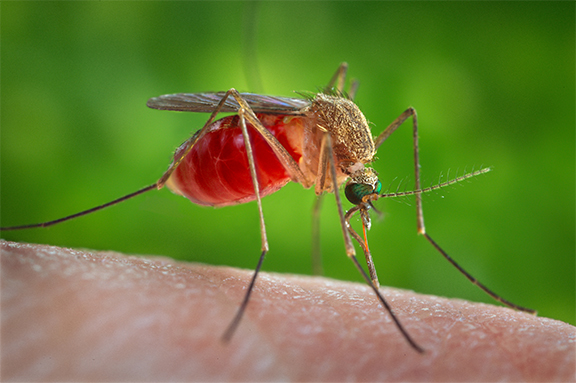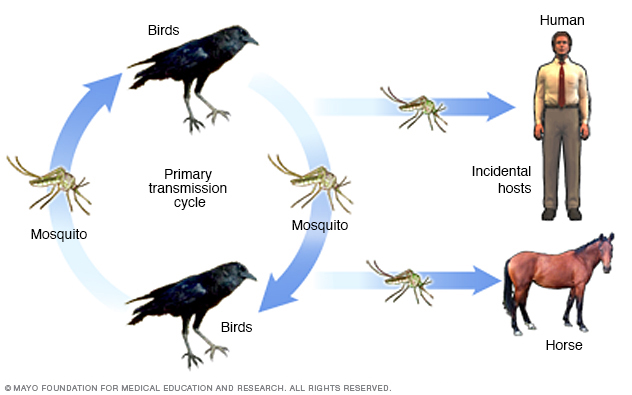West Nile Virus
Report a Case
Disease Reporting Line:
(808) 586-4586
About This Disease
West Nile virus (WNV) disease is a viral illness spread by mosquitoes. It mainly affects birds, but humans, horses, cattle, reptiles, and other animals can also become ill. It was first discovered in Africa in 1937 and first appeared in the U.S. in 1999 in New York. It quickly spread westward across the continental U.S. and by 2004, all states had detected WNV with the exception of Alaska and Hawaii.
Signs and Symptoms
Approximately 80% of individuals who are infected with WNV do not develop any symptoms. Up to 20% of infected people will display symptoms including fever, headache, body aches, nausea, vomiting, and sometimes swollen lymph glands or a skin rash on the chest, stomach and back. Less than 1% of infected people will develop severe form of disease, which may involve inflammation of the brain and can cause disorientation, coma, tremors, convulsions, muscle weakness, vision loss, numbness, paralysis or death.
The symptoms usually begin between 2 and 14 days after being bitten by infected mosquitoes, typically 2–6 days. The incubation period could be as long as 21 days in people with certain medical conditions that affect the immune system.
Transmission
WNV is transmitted to people primarily through the bite of an infected mosquito, mainly Culex mosquitoes. Culex mosquitoes tend to bite in the morning and evening and are not known to spread Zika, dengue, or chikungunya viruses. Mosquitoes become infected when they feed on infected birds. Infected mosquitoes can then spread WNV to humans and other animals when they bite. It is very rarely spread through blood transfusion, organ transplants and through breastfeeding. Since 2003, all blood donations have been screened for the presence of WNV prior transfusion. WNV is not spread through casual contact such as touching or kissing a person with the virus.
Diagnosis
The diagnosis of West Nile virus is based on a combination of clinical signs and symptoms, travel history, possible exposures, in addition to laboratory testing of the blood or cerebrospinal fluid.
Treatment
There is no vaccine or specific treatments for WNV disease. In cases with milder symptoms, people experience fever and aches that subside on their own. Over-the-counter pain relievers can be used to reduce fever and relieve some symptoms. In severe cases, patients often need to be hospitalized to receive supportive treatment, such as intravenous fluids, pain medication, and nursing care.
Risk in Hawaii
West Nile virus is not endemic in Hawaii; cases of the disease in Hawaii have all been infected through exposures outside of the state.
However, Culex species mosquitoes competent to transmit these viruses are present in Hawaii and are widespread throughout the state. Health and wildlife agencies in Hawaii are working to prevent the spread of the virus to the state.
Prevention
The best way to prevent any mosquito-borne infections is to avoid being bitten by mosquitoes. Some steps you can take to prevent mosquito bites include:
- Use Environmental Protection Agency (EPA) approved mosquito repellent to exposed skin areas as recommended by product label
- Wear long pants and long sleeved shirts when outdoors
- Maintain screens on windows and doors.
- Empty or drain water at least weekly from garbage cans, house gutters, buckets, pool and boat covers, coolers, toys, flower pots, or any other containers
- Remove/destroy discarded tires, bottles, cans, pots and pans, and broken appliances
If you are going to be traveling, check before leaving if there is a risk of WNV at your destination, and if so, be sure to take precautions against mosquito bites.
Additional Resources
Information for Clinicians
Disease reporting
West Nile virus disease is notifiable in Hawaii and should be reported by telephone to the Disease Outbreak Control Division, Disease Investigation Branch on Oahu, or to the District Health Office on the neighbor islands as soon as a provisional diagnosis is established.
Disease Reporting Phone Number (24/7)
Oahu (DIB): (808) 586-4586
Maui District Health Office: (808) 984-8213
Kauai District Health Office: (808) 241-3563
Big Island District Health Office (Hilo): (808) 933-0912
Big Island District Health Office (Kona): (808) 322-4877
After hours on Oahu: (808) 600-3625
After hours on neighbor islands: (800) 360-2575 (toll free)
The State Laboratory Division (SLD) of the Hawaii State Department of Health (HDOH) can perform several different tests for West Nile virus.
Healthcare providers submit the specimens to SLD along with the completed West Nile virus initial case and lab submission form and Clinical Specimen Submission Form (SLD Form 81.3). All specimens should be routed to SLD through a certified clinical laboratory. All testing requires HDOH review and approval. If healthcare providers pursue testing through a private commercial lab, consult clinical laboratory for send-out options. Healthcare providers should follow CDC testing criteria for whom to test and guidance for what should be tested.
Last reviewed June 2024


